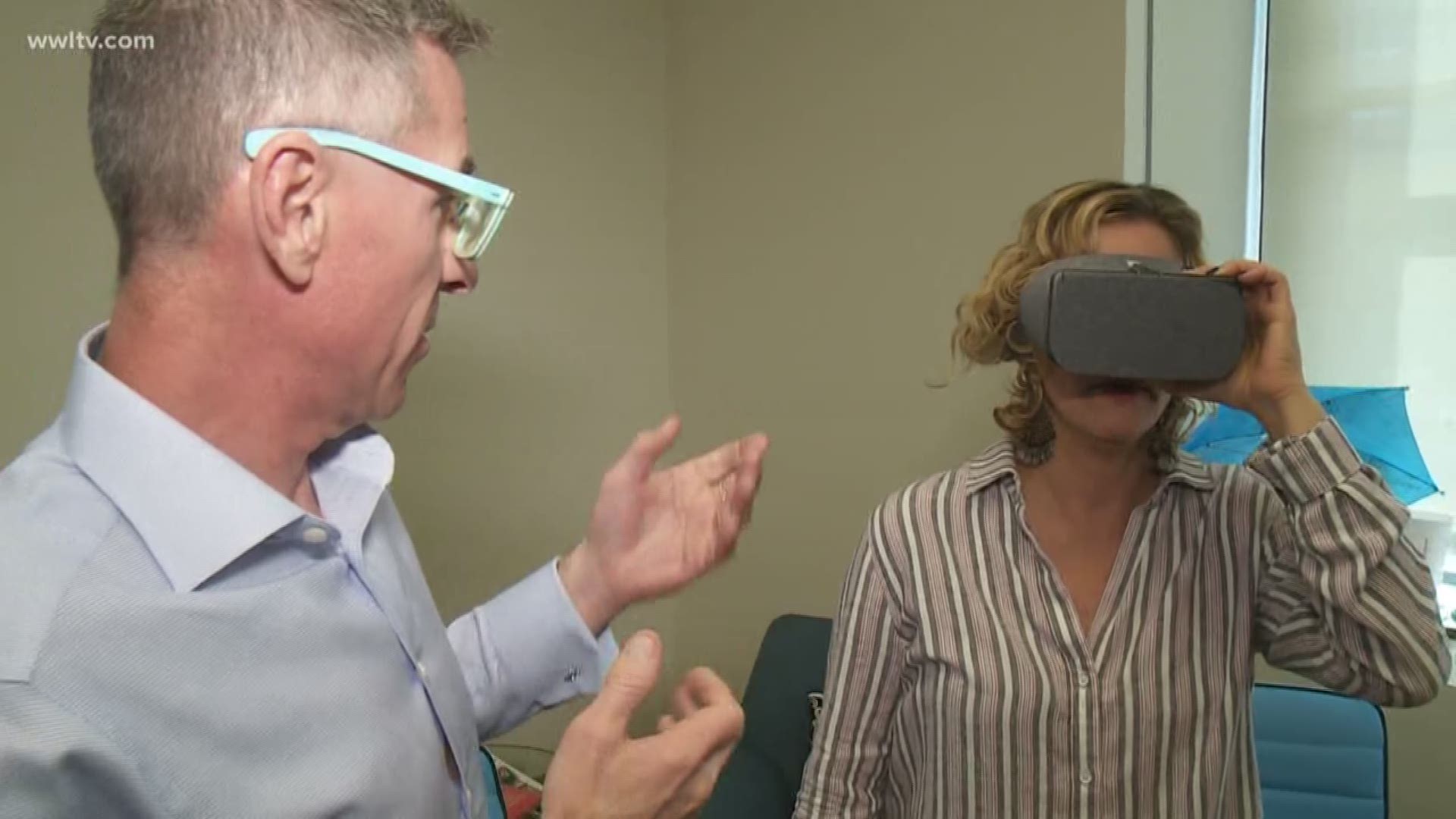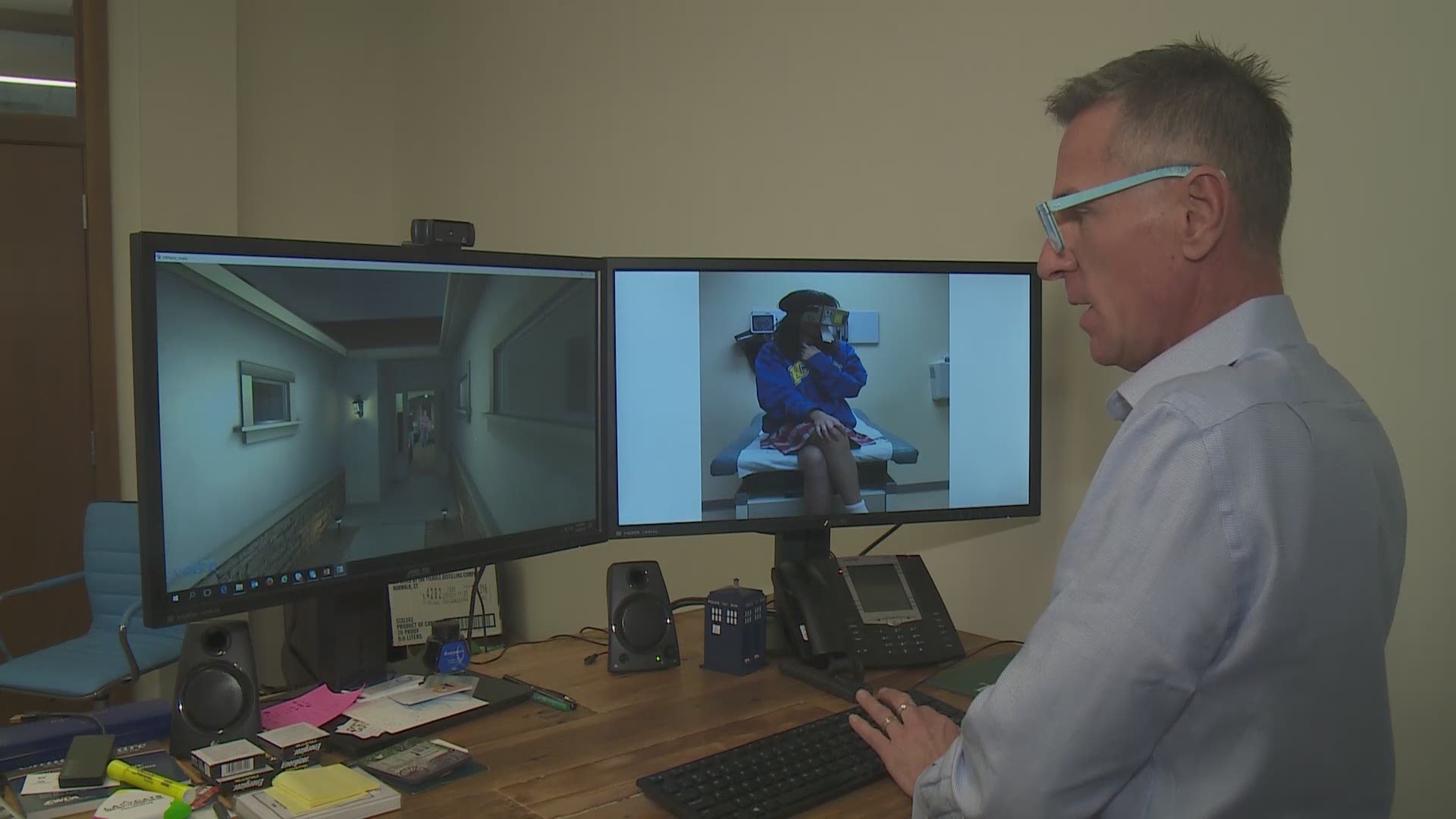NEW ORLEANS -- Around 85 percent of people with drug addiction relapse within a year of treatment, but what if virtual reality could give them a better chance at readjusting to the world?
The key to that technology could be right here in New Orleans.
Christopher O’Shea worked in the movie industry in Hollywood and New York years ago. He's been in long-term recovery for 31 years for cocaine and amphetamine abuse. He had one relapse eight years after sobriety.
"I'm a child of the 70s and the 80s, and it started up very harmlessly, and it was widely accepted. I got to a point in my life where I kept escalating to the next level," said Christopher, 54, now CFO of Imagine Recovery New Orleans.
He met Felicia Kleinpeter at a substance abuse prevention event, and they have been a couple for a few years.
"For me, when I first tried marijuana, it was a very soothing thing. It sort of helped me get through some difficult times in teenage years," said Felicia Kleinpeter, CEO of Imagine Recovery New Orleans.
But as the years went on, like Christopher, her substance abuse escalated.
"I had a car accident when I was 40, and I was prescribed pain killers. And that was pretty much the beginning of the end, as far as a very terrible road down addiction," Kleinpeter said.
Felicia got treatment in California, and has been in recovery for 10 years.
"It was time. I had children that I wasn't allowed to see, that were growing up without their mom, which was not the life I ever intended for them to have. And I knew I could not continue letting that happen," Kleinpeter said as her eyes welled up with tears.
But what brought Christopher and Felicia to New Orleans is Dr. Patrick Bordnick and the high-tech behavior research he is doing at the Tulane School of Social Work.
"I wanted my life to mean something. There's a sign when you come in the School of Tulane that says, 'Do Work That Matters,'" O'Shea recalls.
For 20 years, Dr. Bordnick has been studying cravings and became fascinated with why patients, clean and sober for more than a decade, relapse.
"And they said, 'Well one day, I went to work and I had a very stressful day at the office, and I left and found myself driving in the old neighborhood where I used to buy drugs," Dr. Bordnick recalls one of his patients explaining.
That's when he had a realization: Teaching coping skills to patients in a medical setting by using pictures to trigger memories doesn’t mimic real life. And so before virtual reality was well known, he founded a company helping people with fears and phobias, of flying and public speaking, using virtual reality.
In every study, patients seeing the virtual environments, the party, the cues, the triggers, evoked real-world craving. They were measurable in his lab, including the mood state, elevated respiration and heart rate, stress and cravings.
"And the interesting thing that we saw, six months post treatment, the group that had the virtual reality skills training had greater confidence to resist smoking across the series of high risk situations and were actually smoking less than the other group," Dr. Bordnick said.
So Dr. Bordnick, with a smart phone-based virtual reality company, is creating about a dozen high risk relapse scenarios.
"I'm Marsha. What's your name? Nice to meet you," said one of the avatars in a scenario at a party with alcohol.
This will be one tool to help people practice coping skills in the safety of the therapist's office. Christopher and Felicia plan to use the VR technique at their new uptown treatment center 'Imagine Recovery.'
"If we can get someone to understand the cue and own it, you've now given them a shield to when the situation arises in the world," Christopher said.
"Let's say I've stopped drinking, and I'm a musician in New Orleans and I'm saying, 'I need to go to this club to do my job.' And (in the virtual reality video) I hear glasses clinking, I see people drinking, you get that preemptive experience before you're actually, physically having the experience. So that's incredible," Kleinpeter said.
Christopher says it is working for him.
"I go everywhere and anywhere in my life. I go to Jazz Fest, Voodoo Fest. I go to Mardi Gras. None of that triggers me, but I had practice. I had therapy," Christopher said.
Dr. Bordnick says it has worked for his daughter, diagnosed on the autism spectrum and also with dyslexia and ADHD. It was nearly impossible to console her from the fear and anxiety of having blood drawn, but watching virtual reality, made her calm enough to have multiple vials drawn.
"If I understood what my daughter was experiencing, to help me have better interactions with her, that would mean the world to me," Dr. Bordnick said in a video with Vitality Award when he won one of the 2018 “Not Impossible Awards” at the Consumer Electronics Show in Las Vegas.
"This has a part where it can empower someone. Isn't that what we want?” Christopher said. “I don't want to make someone dependent. I want to make them free.”
The game changer is that the 360-degree videos will be inexpensive, on a smart phone in VR glasses, even homemade ones of cardboard. Dr. Bordnick imagines patients practicing coping skills at home in-between therapy sessions. He also wants to launch a geo-fence app. Your phone would alert and warn you if you were approaching an area where you used to use drugs, that could cause cravings.
"The idea is to empower patients for success. I mean, that's really where we are, that's a dream of mine," Dr. Bordnick said.
You can reach Dr. Patrick Bordnick by Twitter @bordnick
For more on the Imagine Recovery treatment center uptown, click here.


